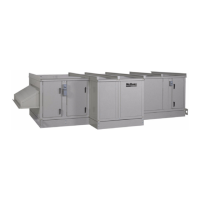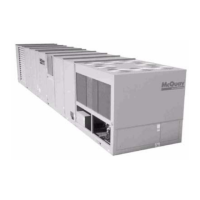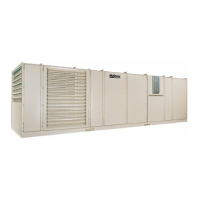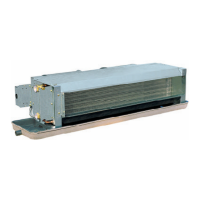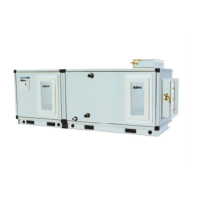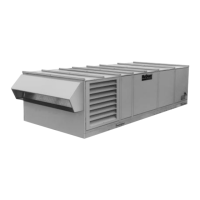Do you have a question about the McQuay Skyline OAH Series and is the answer not in the manual?
Procedures for checking and inspecting units upon receipt to verify contents and identify shipping damage.
Guidelines for storing air handling units on a level surface, including periodic rotation and lubrication.
Explains the coding system for model numbers, cross sections, motor locations, and coil positions.
Requirements for space around the unit for maintenance, including electrical device clearance and coil removal.
Instructions for rigging assembled sections or modules, emphasizing factory-installed base rails and spreader bars.
Guidance on mounting units on roof curbs or level surfaces, including shimming for irregularities and preventing distortion.
Steps for joining shipping sections, including using splice joints, gaskets, and fasteners to ensure an airtight seal.
Procedures for sealing assembly joints with caulk and using splice joints and mating gaskets for an air seal.
Details on attaching sections using "D" gasket and bolts, emphasizing proper gasket placement for drainage.
Instructions for using splice caps and plates to secure top panel flanges and top rails between sections.
Procedures for removing side or top panels and frame channels for access.
Details on opening fan section doors, requiring a 1/2" socket wrench and specific rotation procedures.
Step-by-step guide for safely cutting panels for conduit and wiring, emphasizing sealing all openings.
Guidelines for mounting junction boxes and other components using rivets or through-bolts and proper sealing.
Instructions for fabricating and installing flashing to divert moisture from top duct connections.
Guidance for contractors on mounting field-installed actuators for dampers, ensuring proper support and linkage.
Information on mounting face and bypass sections, including damper linkage and torque requirements.
Instructions for cutting and sealing openings in piping vestibules for field piping to prevent air leakage.
Guidelines for installing water cooling and DX coils, including glycol use, connections, and VFD considerations.
Recommendations for steam piping, including connections, support, flexibility, and steam trap selection.
Procedures for pitching steam coils, avoiding condensate issues, and installing vacuum breakers.
Advice on using steam valves, including avoiding modulating valves on high pressure and proper sizing.
Instructions for installing water heating coils, including connections and avoiding low temperatures.
Instructions for sizing and installing drain pan traps to ensure proper condensate drainage and prevent trap drying.
Steps to remove shipping brackets and tie-down bolts before unit operation for proper isolation.
Tables providing spring mount adjustment settings for different fan discharge positions and unit sizes.
Diagrams and instructions for removing shipping brackets and hold-down bolts for motor-behind fan configurations.
Diagrams and instructions for removing shipping brackets and hold-down bolts for motor-beside fan configurations.
Safety warnings for electrical service, grounding, and conduit entrance locations.
Diagram showing typical electrical conduit entrance points relative to the fan motor junction box.
Essential checks before starting the unit, including installation, debris removal, electrical connections, and bearing checks.
Instructions for starting the fan and correcting rotation if it operates backward by reversing motor connections.
Guidelines and diagrams for aligning fan wheels to inlet funnels for optimal air performance and reduced vibration.
Tables providing dimensional relationships for airfoil and forward curved fan wheels to inlet funnels.
Warning against exceeding fan RPM and temperature limits to prevent distortion, fracture, or vibration.
Table specifying torque values for setscrews on bearing collars and wheel hubs.
Tables detailing fan operating limits (RPM) for various fan types and unit sizes.
Tables specifying fan operating limits (RPM and HP) for plenum, inline, and twin fan configurations.
Information on acceptable vibration levels and the importance of periodic monitoring.
Lists common causes of fan vibration, including wheel imbalance, bent shafts, drive issues, and bearing problems.
Schedule for checking moving parts, fasteners, and electrical connections every six months and annually.
Safety precautions and guidelines for lubricating ball bearings, specifying grease type and temperature limits.
Procedures for greasing motor and fan shaft bearings, with recommended lubricants and intervals.
Importance of matching fixed sheaves for belt and bearing life, and fan speed calculation.
Instructions for mounting and adjusting VM/VP variable pitch sheaves for proper fan speed and balancing.
Detailed steps for mounting and adjusting LVP variable speed sheaves, including flange and locking ring procedures.
Instructions for mounting and adjusting MVP variable speed sheaves, including locking setscrews and pitch diameter changes.
Table specifying torque values for various screw types used in sheave assemblies.
Principles for proper belt tensioning, emphasizing the lowest tension without slippage for longevity.
Step-by-step guide to measuring belt tension using a belt tension checker and calculating applied force.
Table providing belt deflection force values based on cross section, sheave diameter, and RPM.
Instructions for removing and replacing filters in front-load filter options, ensuring proper seating.
Explanation of filter gauges indicating pressure drop for clean and final filters.
General advice on keeping coils clean for maximum performance, including brushing, vacuuming, or using chemical cleaners.
Procedures for winterizing water coils to prevent freeze-up damage, including draining and antifreeze treatment.
Instructions for removing and replacing the entire fan assembly, including housing, bearings, and base.
Procedures for removing and installing stacked coils, involving plates, troughs, and fasteners.
Instructions for removing and installing staggered coils, including panel access and fastener management.
Guidance on ordering replacement parts, emphasizing the need for unit model and serial numbers for accuracy.
Information on warranty details and how to find local McQuay representatives for support.
Procedure for returning defective materials under warranty, requiring authorization and proper documentation.
Checklist for initial physical and electrical checks before starting the unit.
Section for recording fan rotation, voltage, amp draw, and RPM for both supply and return fans.
Checks for damper presence, smooth operation, and tight sealing.
Checks for electric heat service, coil condition, terminals, and stage operation.
Checks for pressure tests, drain pan function, and heat wheel operation.
Questions regarding visible shipping damage and the product's overall appearance.
Assessment of unit section fit, cabinet air leakage, and refrigerant leak detection.
Verification of electrical control function, labeling adequacy, and product serviceability.
| Brand | McQuay |
|---|---|
| Model | Skyline OAH Series |
| Category | Air Handlers |
| Language | English |
